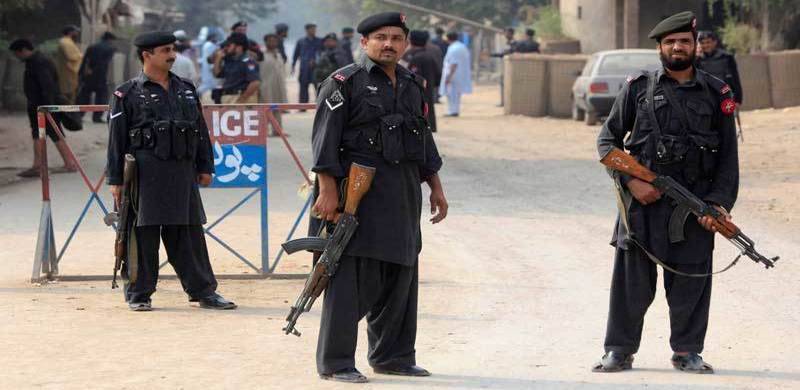
Peshawar
The Khyber Pakhtunkhwa (KP) government has imposed Section 144 in the districts of Charsadda and Dera Ismail Khan as the Azadi March is underway.
The orders have been issued by the deputy commissioners of both districts to prevent loss to public properties during the Azadi March of Jamiat Ulema-e-Islam Fazl (JUI-F).
District Charsadda is home to Awami National Party’s president, Asfandiyar Wali Khan, who would be leading the anti-government marchers in Charsadda towards Islamabad. Meanwhile, Dera Ismail Khan is home to JUI-F leader Maulana Fazlur Rehman.
The president of JUI-F’s KP chapter, Maulana Atta ur Rehman, had earlier said on October 27, that a large number of people had come out to show solidarity with opposition parties, which had created fear in Pakistan Tehreek-e-Insaf’s government.
Atta Ur Rehman said that Section 144 had been imposed to prevent JUI-F and ANP’s workers from participating in the Azadi March.
Under Section 144, arms shops in the districts would be shut down, while there would be a ban on outrageous speeches, motorcycle riding, and sale of kerosene oil and acids.
Police have stated that though Section 144 had been imposed in Charsadda, they had not received any instruction to stop or arrest Azadi march participants.
The march, announced by JUI-F, began from Karachi and has reached Sukkar. JUI-F chief Maulana Fazlur Rehman is leading the gathering, which is expected to reach Islamabad on October 31.
Unlike the sit-in held by PTI in 2014, the conditions this time are quite different as the role of the media, in particular, has been extremely limited. No coverage has been given to the JUI-F chief after PEMRA put a ban on his appearance.
Maulana Fazlur Rehman is being accompanied by senior leaders of the Pakistan Muslim League-Nawaz, Pakistan People’s Party, ANP and other parties. He was joined by former chairman of the Senate, Mian Raza Rabbani, former governor of Sindh, Muhammad Zubair, ANP provincial president and former senator Shahi Syed at his container.
At the start of the march, the government sprang into action. Mufti Hamidullah, a very active leader of the JUI-F, was found to be an ‘alien’ and the media was directed not to invite him in talk shows. Meanwhile, another party leader, Mufti Kafayatullah, who was widely known in the media for aggressively defending his party’s stance, was also taken into custody.
Mansehra district police officer accused Mufti Kafayatullah of motivating people to participate in the march, holding corner meetings, and collecting donations for the Azadi March.
Deputy Commissioner Mansehra has stated that section 144 was imposed in the city one month before the call of the Azadi march and that it had not been taken to frustrate JUI-F supporters.
The Khyber Pakhtunkhwa (KP) government has imposed Section 144 in the districts of Charsadda and Dera Ismail Khan as the Azadi March is underway.
The orders have been issued by the deputy commissioners of both districts to prevent loss to public properties during the Azadi March of Jamiat Ulema-e-Islam Fazl (JUI-F).
District Charsadda is home to Awami National Party’s president, Asfandiyar Wali Khan, who would be leading the anti-government marchers in Charsadda towards Islamabad. Meanwhile, Dera Ismail Khan is home to JUI-F leader Maulana Fazlur Rehman.
The president of JUI-F’s KP chapter, Maulana Atta ur Rehman, had earlier said on October 27, that a large number of people had come out to show solidarity with opposition parties, which had created fear in Pakistan Tehreek-e-Insaf’s government.
Atta Ur Rehman said that Section 144 had been imposed to prevent JUI-F and ANP’s workers from participating in the Azadi March.
Under Section 144, arms shops in the districts would be shut down, while there would be a ban on outrageous speeches, motorcycle riding, and sale of kerosene oil and acids.
Police have stated that though Section 144 had been imposed in Charsadda, they had not received any instruction to stop or arrest Azadi march participants.
The march, announced by JUI-F, began from Karachi and has reached Sukkar. JUI-F chief Maulana Fazlur Rehman is leading the gathering, which is expected to reach Islamabad on October 31.
Unlike the sit-in held by PTI in 2014, the conditions this time are quite different as the role of the media, in particular, has been extremely limited. No coverage has been given to the JUI-F chief after PEMRA put a ban on his appearance.
Maulana Fazlur Rehman is being accompanied by senior leaders of the Pakistan Muslim League-Nawaz, Pakistan People’s Party, ANP and other parties. He was joined by former chairman of the Senate, Mian Raza Rabbani, former governor of Sindh, Muhammad Zubair, ANP provincial president and former senator Shahi Syed at his container.
At the start of the march, the government sprang into action. Mufti Hamidullah, a very active leader of the JUI-F, was found to be an ‘alien’ and the media was directed not to invite him in talk shows. Meanwhile, another party leader, Mufti Kafayatullah, who was widely known in the media for aggressively defending his party’s stance, was also taken into custody.
Mansehra district police officer accused Mufti Kafayatullah of motivating people to participate in the march, holding corner meetings, and collecting donations for the Azadi March.
Deputy Commissioner Mansehra has stated that section 144 was imposed in the city one month before the call of the Azadi march and that it had not been taken to frustrate JUI-F supporters.
